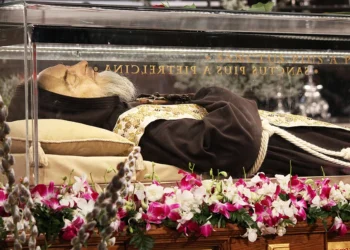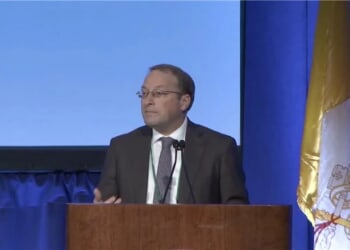Rabbi and author Jonathan Cahn is known for his ability to draw parallels between the often horrific events of modern times and their biblical precursors. His 2011 debut novel, The Harbinger, accomplished this with the 9/11 attacks. Glenn Beck called it an incredible story that ‘puts forth a conversation about God that we don’t otherwise talk about in [America].’
In his tenth book, 2024’s The Dragon’s Prophecy, Cahn draws the exact parallels between the warnings of the Bible and the terror attacks on Israel on October 7, 2023. Now, in a new film of the same name from director Dinesh D’Souza (and executive produced by Salem Media), Cahn’s vision of the attacks and their historical precedents is brought to the screen with a mix of interviews, archeological study, and harrowing scenes from that fateful day in Southern Israel.
If you have not seen a lot of the footage from the 10/7 massacre, be forewarned that the first 15 minutes of this movie are difficult to watch. D’Souza recounts the events of the Hamas attack by talking to people who were in the kibbutzes and at the Nova Music Festival, interspersed with graphic scenes of the violence. Much like the opening to Saving Private Ryan, you will want to turn your head away from the screen on more than one occasion.
But just like Spielberg’s World War II epic, D’Souza isn’t sharing these scenes for gratuitous reasons. He has a purpose. We need to see what happened to understand the stakes of Israel’s fight. That purpose never hits home harder than when we stop to think about why the footage exists in the first place. It’s because the Hamas terrorists, and many of the other Palestinians back in Gaza that day, were proud of what they did. They recorded videos of atrocities and posted them on social media. They called their parents to boast of how many Jews they killed that day.
Most heart-wrenching of all is D’Souza’s interview with one of the Nova survivors, Rafaela Treistman, as she stands amid the memorial at the music festival site, recounting her day of terror while surrounded by images of the faces of the slain, including her boyfriend, Hanni Glazer.
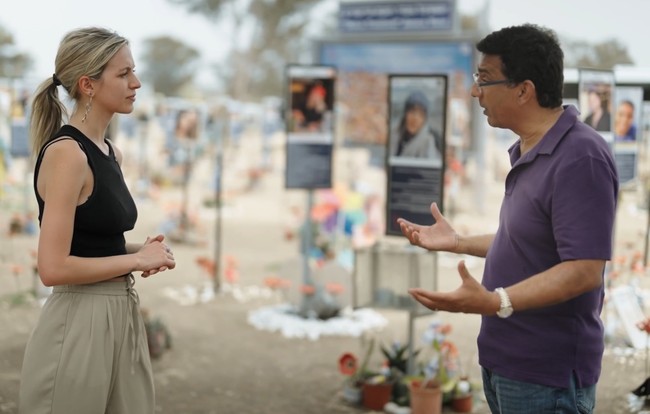
The indelible (but all too necessary) scenes and stories from 10/7 are just the prologue to The Dragon’s Prophecy, however. Having established this gruesome context, D’Souza then sits down with Cahn to discuss the biblical precedents for the conflict that Israel is facing today.
Through citations of Scripture, Cahn makes the parallel that Israel’s conflict with the Palestinians is merely a resurrection of the Biblical conflict between the Israelites and the Philistines. But it is not just the etymological evolution of the words Philistine and Palestine that makes the connection clear. Cahn shows the Biblical parallels with many of the aspects of Palestinian culture that we find so shocking today, such as training children in combat through a hatred of the Jews, as in the case of Goliath, and the celebration of taking Jewish people as hostages, as in the case of Samson.
Ultimately, the point that Cahn demonstrates is that the Israel-Palestinian conflict is not merely a territorial, political, or even ideological struggle; rather, it is nothing short of an apocalyptic battle between the forces of good and evil, between God and Satan, the dragon. The biblical connections may be well-known to scholars or historians, but they are fascinating nonetheless, particularly for the average viewer.
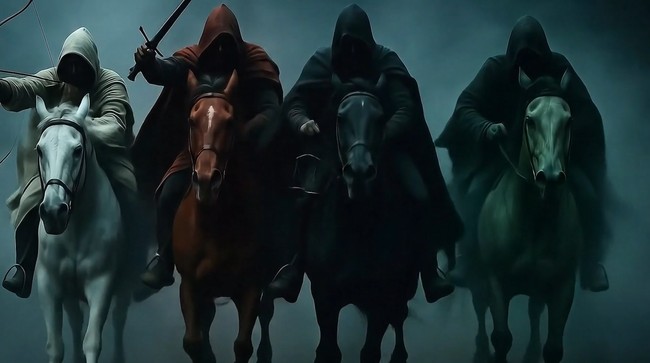
D’Souza also takes time in the film to explore the ancient origins of Israel. His purpose is to show definitively that the Bible is not mythology, but history. Not fiction, but fact.
This begins with a conversation on Biblical archaeology with author Eric Metaxas, discussing digs at historical sites such as Caesarea, where unearthed tablets proved the existence of Pontius Pilate, and other relics that established the final resting place of Caiaphas. Ultimately, D’Souza undertakes his own journey to sites including Meggido and Shiloh, as well as Jerusalem, to visit the excavated City of David and the Pilgrimage Road where Jesus walked.
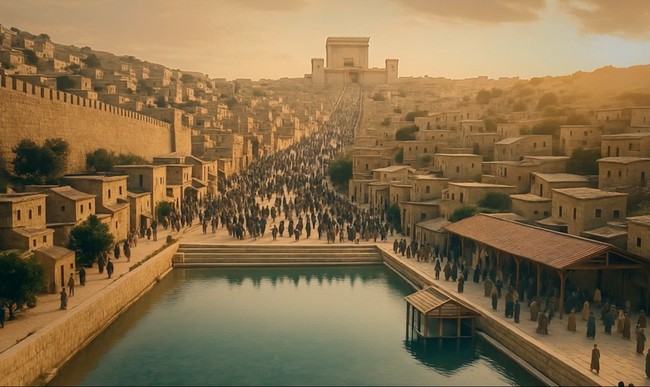
The archaeological explorations seem, at first, like a distraction from the central theme of the movie, but they are not. D’Souza’s point is to counter the prevailing narrative from Palestinians (and far too many in Western media and on American college campuses) that Jews are ‘colonizers’ and that Israel ‘stole’ their land from its rightful inhabitants.
On the contrary, it is Islamic extremists who are the colonizers, often brutally. This is most visibly depicted with the mosque that still sits to this day atop the Temple Mount.
D’Souza returns to modern times to trace the connections, even alliances, between Palestinian leaders (including Yasser Arafat) and similar forces of evil seen in the 20th Century, most notably another group of people in Europe who also wanted to exterminate the Jews.
Poignant interviews with Israeli Prime Minister Benjamin Netanyahu and U.S. Ambassador to Israel Mike Huckabee underscore the point that not only has Israel belonged to the Jews for more than 3,500 years, but also that Cahn’s observations and assessment about the fundamental stakes in Israel’s battle for survival are not overstated.
Importantly, the movie does not avoid or dismiss the moral concerns that Israel’s retaliation against Hamas after 10/7 has taken many innocent lives. D’Souza clearly wrestles with this dilemma, but also acknowledges that no other nation in the world is held to the same unfair standard as Israel when it comes to prosecuting war, conflicts that are generally initiated by enemies that want to wipe Israel off the map.
The movie recognizes that the responsibility for the Palestinian people ultimately lies with the leaders who have failed them and indoctrinated them with an ideology of hate. As Ambassador Huckabee says, ‘Gaza could have been Singapore. Hamas turned it into Haiti.’
The Dragon’s Prophecy ends with a simple question and a call to action for Jews and Christians alike. Because the forces of the dragon are not only seeking to destroy Israel, but Christianity and Western civilization as well. The battle is not political, but spiritual and eternal.
Will we don the spiritual armor of the historical, not mythological, figures in the Bible and become warriors?
It is the final, and only, challenge D’Souza makes to the viewer.
Will we become dragonslayers?
**************

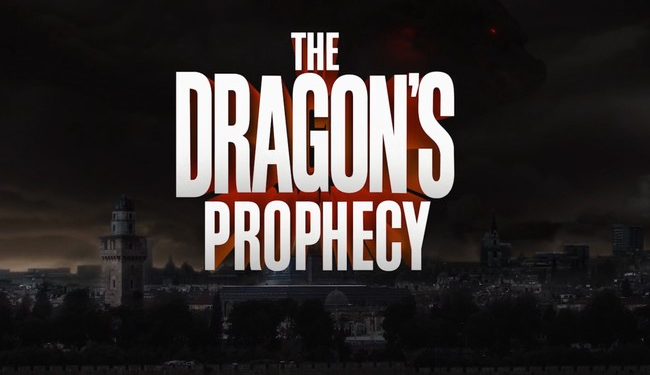
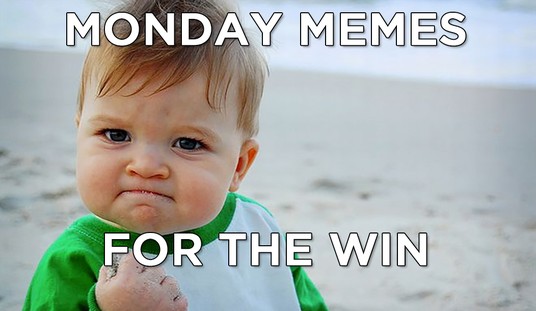






![Florida Officer Shot Twice in the Face During Service Call; Suspect Killed [WATCH]](https://www.right2024.com/wp-content/uploads/2025/12/Inmate-Escapes-Atlanta-Hospital-After-Suicide-Attempt-Steals-SUV-Handgun-350x250.jpg)

![Keith Ellison Caught Promising to Fight State Agencies for Somali Fraudsters [WATCH]](https://www.right2024.com/wp-content/uploads/2026/01/Keith-Ellison-Caught-Promising-to-Fight-State-Agencies-for-Somali-350x250.jpg)



